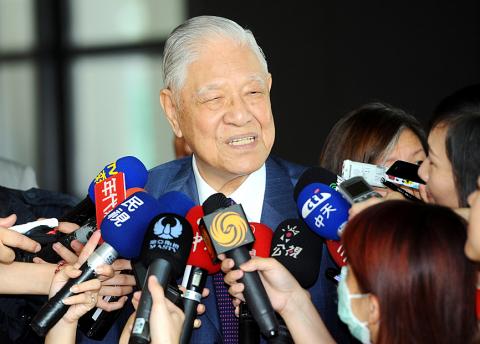Former president Lee Teng-hui (李登輝) yesterday began a three-day trip to agricultural areas in Chiayi and Tainan in the hope of understanding more about the sector, which used to be Taiwan’s pride, but has been facing numerous challenges in recent years.
This was the 89-year-old’s second trip to southern Taiwan, after a visit to Greater Kaohsiung and Pingtung County last month. He has been recovering from surgery to remove a cancerous tumor in November last year.
Lee highlighted the importance of the agricultural sector in his remarks yesterday evening to about 100 people in Jingliao Village (菁寮), Houpi District (後壁), Greater Tainan, which is known as a rice-growing area.

Photo: Chang Chia-ming, Taipei Times
As an agriculture major at university and an agricultural official early in his political career, Lee said he has always paid special attention to the development of this important sector and reiterated that the government should stop exploiting farmers and further develop the strategically vital industry.
Agriculture cannot be developed without appropriate planning for land use and water resources, and the government should help farmers with these issues, he said, adding that the government should also encourage rice consumption.
With rising commodity prices, in particular fertilizers, farmers are entitled to demand government subsidies, Lee said.
“If the government will not grant a subsidy, you have every right to march on the streets to voice your opposition. And if you go, I will go with you,” he said.
Earlier in the afternoon, the former president had a glimpse of one of the sector’s star industries with a stop at Norman Orchids, an orchid farm located in Tainan Biotechnology Science Park with annual revenues of NT$200 million.
On Tuesday night, Lee gave a rare two-and-a-half-hour interview to Sanlih TV in which he addressed issues that included Taiwan’s sovereignty and engagement with China, his observations on President Ma Ying-jeou (馬英九) and the domestic economic situation.
Lee reaffirmed democracy and freedom were Taiwan’s “backbone” and said rhetoric about “one China” and nationalism was already “outdated”.
He repeated several points he had made during his first visit to southern Taiwan last month, saying that Ma viewed himself as an “emperor” who could rule the country on his own and that he should report to the Legislative Yuan.
Lee said Beijing would not be able to annex Taiwan as the US had turned its focus back to the Asia-Pacific region, especially northeast Asia.
As for state-run companies, Lee said they should be privatized to increase their competitiveness.

Taipei has once again made it to the top 100 in Oxford Economics’ Global Cities Index 2025 report, moving up five places from last year to 60. The annual index, which was published last month, evaluated 1,000 of the most populated metropolises based on five indices — economics, human capital, quality of life, environment and governance. New York maintained its top spot this year, placing first in the economics index thanks to the strength of its vibrant financial industry and economic stability. Taipei ranked 263rd in economics, 44th in human capital, 15th in quality of life, 284th for environment and 75th in governance,

Greenpeace yesterday said that it is to appeal a decision last month by the Taipei High Administrative Court to dismiss its 2021 lawsuit against the Ministry of Economic Affairs over “loose” regulations governing major corporate electricity consumers. The climate-related lawsuit — the first of its kind in Taiwan — sought to require the government to enforce higher green energy thresholds on major corporations to reduce emissions in light of climate change and an uptick in extreme weather. The suit, filed by Greenpeace East Asia, the Environmental Jurists Association and four individual plaintiffs, was dismissed on May 8 following four years of litigation. The

A former officer in China’s People’s Liberation Army (PLA) who witnessed the aftermath of the 1989 Tiananmen Square massacre has warned that Taiwan could face a similar fate if China attempts to unify the country by force. Li Xiaoming (李曉明), who was deployed to Beijing as a junior officer during the crackdown, said Taiwanese people should study the massacre carefully, because it offers a glimpse of what Beijing is willing to do to suppress dissent. “What happened in Tiananmen Square could happen in Taiwan too,” Li told CNA in a May 22 interview, ahead of the massacre’s 36th anniversary. “If Taiwanese students or

The New Taipei City Government would assist relatives of those killed or injured in last month’s car-ramming incident in Sansia District (三峽) to secure compensation, Mayor Hou You-yi (侯友宜) said yesterday, two days after the driver died in a hospital. “The city government will do its best to help the relatives of the car crash incident seek compensation,” Hou said. The mayor also said that the city’s Legal Affairs, Education and Social Welfare departments have established a joint mechanism to “provide coordinated assistance” to victims and their families. Three people were killed and 12 injured when a car plowed into schoolchildren and their